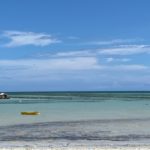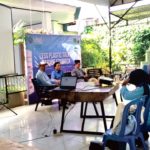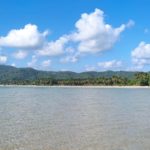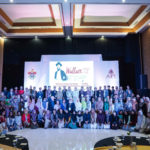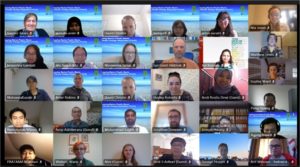
CSERM-UNAS is collaborating with Bangor University, UK, in a workshop program entitled “Addressing Marine Plastic Waste as a Climate Change Adaptation Priority in Indonesia”, which is funded by the Newton Fund – British Council. Initially, the program was developed by Dr. Tara Smith[[1]], a lecturer at Bangor University, UK, and Dr. Asep Adhikerana, a research fellow at the Centre of Sustainable Energy and Resources Management (CSERM), Universitas Nasional (UNAS). Aquatera UK was also involved in the proposal development, which in the workshop, it played a crucial role as the facilitator. The aims of this Workshop Program are as follows:
- To develop an evidence base connecting the problems of marine plastic waste and climate change adaptation in Indonesia
- To stimulate research between the UK and Indonesia which examines the causes as well as the consequences of the combined problems of marine plastic waste and climate change adaptation in Indonesia
- To catalyse interdisciplinary research projects that integrate scientific knowledge with an understanding of national and international development processes related to climate change and plastic waste
- To develop the capacity of early career researchers to build and lead interdisciplinary and gender-balanced research teams
- To support early career researchers to develop fundable project proposals that provide an evidence-base for policy making and action
- To create a dynamic and responsive network of researchers in the UK and Indonesia who have the capacity to become mentors of future early-career researchers responding to complex and inter-connected global challenges.
As stated above in the program’s aims, this is not just an ordinary workshop, but it is also an opportunity for Early Career Researchers (ECRs) to apply for “Challenge Prizes” that is provided by this program. In general, the program consists of the following sequences: (a) Online workshop – 3 days; (b) Challenge Prizes’ proposal submission, selection, and award (3 weeks), (c) Challenge Prizes’ research implementation carried out by ECRs, who receive the prizes (4 months), and (d) program conclusion: (a) reports of Challenge Prizes’ researches, and (b) a final report to the British Council.
By the time of program implementation, Bangor University assigned Dr. Tara Smith for another task, and assigned Dr. Peter Robins – who would previously play a role as a mentor in the workshop – to lead the program, along with Dr. Asep Adhikerana as a co-leader.
As per September 8, 2021, the program is still ongoing, and right now it is at the Challenge Prizes’ proposal writing and submission. While, the details of a three day workshop is presented as follows.
Due to the global outbreak of Covid-19, the workshop was done virtually, from Agustus, 31 to September 2, 2021, using MS Teams as the platform. As mentioned above, this workshop was facilitated by Aquatera UK, and participated by: (a) ECRs from a variety of background and disciplines (27 persons – see Figure 1 for the composition); (b) resource persons from academics, researchers, representatives of GoI, and NGO representatives (42 persons); and (c) observers from various organizations and government officials. In order for ECRs to understand how to develop a collaborative multi-discipline research, the workshop provided two mentors, namely: Dr Jito Sugardjito, Director of the Centre of Sustainable Energy and Resources Management (CSERM) – Universitas Nasional (UNAS), and Dr Morwenna Spear, a Research Officer at the Department BioComposites Centre, Bangor University, UK.
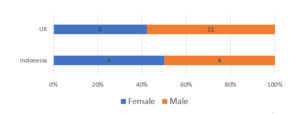
Figure 1. The composition of participating ECRs at the workshop
The three-day workshop agenda is briefly described as follows.
Day 1 was initiated with a welcome and introduction to present the aims and objectives of the workshop. This was followed up with Panel Discussion 1 on the UNFCC, COP26, and the Development of Indonesia’s National Adaptation Plan, where the resource persons presented their respective topics. The resource persons were: (1) Dr Haley Roberts, Senior Lecturer in International Law, Bangor University, (2) Dr. Nadia Amelia Ridwan (Former National Project Coordinator of Japan International Cooperation Agency and Ministry of Environment Japan ) and Ms. Kazuki Matsuura Morimoto (PhD Student, Faculty of Sustainability Studies, Hosei University / Former Project Specialist/Coordinator of Japan International Cooperation Agency and Ministry of Environment Japan); and (3) Dr. Retno Sulastri, Ministry of Environment and Forestry on The Development of Indonesia’s National Adaptation Plan. The presentations were followed up with panel discussion.
After a break, the Panel Discussion 2 was conducted with a topic of Developing Collaborative Research Projects, and lead by Dr Jito Sugardjito (CSERM – UNAS), Dr Morwenna Spear (Bangor University), and Dr Peter Robins (Bangor University). Here Dr. Robins stimulated the participants to express their thoughts about the climate change and plastic waste problems, using the google jamboard platform.
Afterward, another panel was undertaken to discuss the involvement of multidisciplinary and multi-sector groups in researches, where participants were stimulated to create a collaborative research based on this ABCG (Academic, Business, Community, Government) principle.
Later, the participants were clustered into Break-Out Groups (ABCG Matching) to identify thematic synergies within groups.
Day 2 was initiated with a session to Recapture, Reinforcement, and Q&A from the Day 1 sessions. Thenafter, a virtual tour of the TakaBonerate – Kepulauan Selayar Biosphere Reserve, which was followed with live dialogues with 2 invited speakers from Selayar, namely: Mr. Andi Zulfadhli Zainal (Tourism and Culture Agency, Selayar Regency) and Mr. Zul Janwar (Marine Affairs and Fisheries Agency, Selayar Regency).
After a short break, Panel Discussion 1 was done under a topic of Plastic Waste and Climate Change in the TakaBonerate – Kepulauan Selayar Biosphere Reserve. Four resource persons presented their perspectives, namely: (1) Prof Jan Hiddink (Bangor University), (2) Prof Evelyn Taboada (USC), (3) Dr. Christian Dunn (Senior Lecturer in Zoology, the Associate Director of the Bangor Wetlands Group, and Director of the Plastic Research Centre of Wales), and (4) Dr Dedi S. Adhuri (Indonesian Institute of Science on the Plastic Waste and Climate Change in the Taka Bonerate-Kepulauan Selayar Biosphere Reserve).
After a short session of Q&A, Panel Discussion 2 was done under a topic of achieving research impact through stakeholder engagement, where three resource persons presented their respective concerns, namely: (a) Ms. Marianne Catanyag (Ocean Tera, the Philippines), (2) Dr Mike Bell (Research Fellow at International Centre for Island Technology (ICIT) Heriot Watt University, UK), and (3) Dr Gayatri Reksodihardjo (Environmental NGO – Indonesia).
Day 3 was initiated with a session to Recapture, Reinforcement, and Q&A from the Day 1 sessions. Afterward, a Plenary Discussion with Mentors was conducted to discuss steps to prepare successful grant proposal. The participants were asked to continue in their respective ABCG grouping and develop a proposal outline, that should be presented before the workshop participants in a “Dragons’ Den”-style role play. A closing plenary discussion was held to conclude the workshop and provide the participating ECRs with the next steps to be taken after the workshop.
The workshop was successfully done, and we are now waiting for the proposals submitted by the ECRs for the Challenge Prizes.

